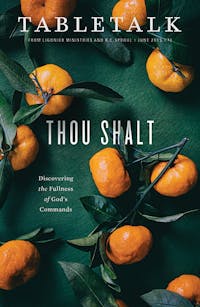
Request your free, three-month trial to Tabletalk magazine. You’ll receive the print issue monthly and gain immediate digital access to decades of archives. This trial is risk-free. No credit card required.
Try Tabletalk NowAlready receive Tabletalk magazine every month?
Verify your email address to gain unlimited access.
For all the differences that (rightly) separate us, we have much in common with Roman Catholicism. Rome affirms the great ecumenical creeds of the first millennium. She affirms the Trinity as well as the virgin birth and resurrection of Christ. She affirms that the Bible is the Word of God. One thing we don’t have in common, however, is the Ten Commandments. To be sure, Roman Catholic Bibles include Exodus 20 and Deuteronomy 5. But Rome separates what we call the tenth commandment in two, the ninth being “Thou shalt not covet thy neighbor’s wife,” and the tenth being “Thou shalt not covet thy neighbor’s goods.” Rome doesn’t, however, end up with eleven commandments, because it combines what we consider to be the first and second.
The division of the tenth commandment would probably strike any unbiased reader as artificial and unnatural. That said, I’m confident that many Protestants have only a murky understanding of the difference between the first and second commandments. The first forbids us from having other gods before God; the second forbids the making of graven images. Are these not both simple commands not to worship false gods and instead to worship the true and living God alone?
Not at all. The first commandment more than sufficiently rules out any form of worship of anything other than the living God. Whether you do so through the use of graven images matters not. The second commandment explores a different issue—it forbids the worship of the true God through the use of images.
Remember when Aaron made the golden calf? He said this: “These are your gods, O Israel, that brought you out of the land of Egypt!” (Ex. 32:4). He did not tell the people, “You know Yahweh, the God Moses met with, the one we thought rescued us from slavery, who parted the Red Sea? Turns out it wasn’t Him after all, but a different deity, this one.” Indeed, in the next verse, we read what Aaron actually said: “Tomorrow is a feast to the LORD.” The golden calf was less a violation of the first commandment, and more a violation of the second.
We get at the same distinction when we consider our own propensities. Because most of us in the West, believers or not, are not given to bowing before statues, we might be tempted to think we’ve gotten past idolatry. But in our more honest moments, we concede that we have constructed our own gods out of the things we desire most, for some money, others reputation, and so on. That is altogether true. But again, it’s a first commandment problem more than a second commandment problem.
Given, then, that we are not so inclined to bow down before statues, including statues designed to communicate the true and living God, does that mean we have the second commandment licked? By no means. We break the second commandment when we seek to worship the true God through images, including images we construct in our own minds. (Keep in mind that few people, if any, ever actually believed that the god they constructed was a true god. Even the most primitive societies looked at statues and images as aids to worship, tools through which a real god was given worship, and not as the gods themselves.)
Our unbelieving neighbors are often shockingly honest about their own idolatry. Indeed, most of them have named the god who they believe exists, and they worship this god through an image they construct. They call their god “God-to-me.” You surely have heard folks say, “Well, God-to-me is like an embracing, loving force” or “God-to-me wants me to do what I think is best.” It should never surprise us that the model for God-to-me, the form we seek to copy when constructing him, is us. In fact, were our unbelieving neighbors just a smidge more honest, they would confess that the name of their god is “God-is-me.”
The Ten Commandments, though they are universally binding, were given first to God’s covenant people. And God never wastes His breath. If God’s people then needed to be warned against idolatry, you can bet we do as well. Sometimes our idolatry shows up in our theological debates. How often have you heard someone say (or said yourself ), “I could never worship a god who … “? If what follows is something that actually describes the God of the Bible, then such is a confession that I could never worship the true God. When we say, “I prefer to focus on the more gentle God of the New Testament,” we are committing idolatry (and forgetting that God only killed an innocent man once, and that was in the New Testament). We have more than our share of “God-to-me’s” even in the evangelical church.
The second commandment commands that we worship God as He is, and that we do so as He has commanded. When my father was a young seminarian, he wrote up a card that he placed on his desk. “Your duty,” it said, “is to believe and to preach what the Bible says, not what you want it to say.” The second commandment tells us that our duty is to believe in, to learn about, to love, and to worship the God who is, not the god we wish that He were.
